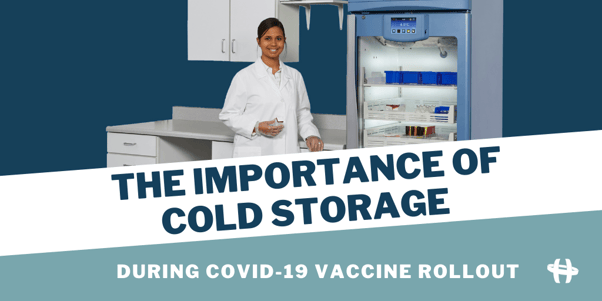
With the recent emergency use authorization for the Pfizer and Moderna vaccines, cold storage has become a front and center topic. While the concept of cold storage is not new, the need for reliable cold storage and maintaining cold storage throughout distribution of the vaccines has become increasingly important.
Pfizer’s COVID-19 vaccine requires storage at -70°C in an ultra-low freezer and can only remain stable in a refrigerated environment of 2-8°C for 5 hours. Moderna’s vaccine can be stored for up to 6 months in a freezer around -20°C and remains stable in a refrigerator between 2°C and 8°C for 30 days.
Providers need to ensure they not only have the right equipment needed for these vaccines, but they also need to ensure they have reliable equipment to store this invaluable vaccine product. Since the beginning of the COVID-19 vaccine roll out, there have been a handful of instances where vaccine product had to be distributed quickly or, in the worst-case scenario, destroyed because of faulty equipment.
To help safeguard vaccine product, the CDC recommends the following in their Vaccine Storage and Handling Toolkit to providers:
- Select a medical-grade or purpose-built unit designated for the storage of medications and vaccines
- Monitor the equipment’s temperature using a digital data logger (DDL)
- Calibration testing every 1-2 years, or according to the manufacturer’s guidelines
- Conduct routine maintenance for all vaccine storage units and related equipment so that your equipment functions at maximum efficiency
ADDITIONAL CONSIDERATIONS
Although these features are not outlined in the CDC Vaccine Storage and Handling Toolkit, they are important to consider when selecting a vaccine refrigerator or freezer.
- Designed and built by an FDA GMP and ISO 13485 compliant manufacture of medical devices
- Low Global Warming Potential for sustainability initiatives
- Minimal heat output to help maintain HVAC systems
- Low operating decibels for a quiet staff and patient environment
It is crucial for your facility to have proper vaccine cold storage that is built for medical-grade storage, monitored accurately, maintained, and repaired as needed. This equipment protects patients from inadvertently receiving compromised vaccine and your facility against potential vaccine loss.
OTHER BLOGS YOU MIGHT BE INTERESTED IN...
- Best of 2020: Vaccine Storage
- COVID-19 Vaccine Update
- Emerging Standards for Vaccine Storage Units
- Vaccine Storage: Capacity and Quality Considerations for the 2020-2021 Influenza Season
To help vaccine providers prepare and manage COVID-19 Vaccine rollout, we’ve put together a Vaccine Refrigerator Best Practices Guide to help you understand the CDC guidelines and highlight other important considerations when selecting a vaccine refrigerator.




